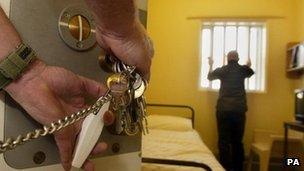Carloway law reform could affect justice, MSPs told
- Published

Abolishing corroboration in Scots criminal cases could end the presumption of being innocent until proven guilty, legal experts warned.
The move could also increase miscarriages of justice, Holyrood's justice committee has heard.
The concerns were expressed by representatives from the Faculty of Advocates and the Law Society.
A government-commissioned review, conducted by Lord Carloway, external, recommended the change to corroboration.
In the Scottish legal system, all key evidence presented in a criminal prosecution currently has to be backed by two sources, and has traditionally been regarded as an important safeguard against miscarriages of justice.
But judge Lord Carloway said corroboration in prosecutions was now "archaic", and said changes would lead to a system based on "quality of evidence" and not "quantity of evidence".
However, Brian McConnachie QC, representing the Faculty of Advocates Criminal Bar Association, told MSPs: "There is a concern if corroboration is not required, even if it is potentially available, that the police will not carry out exhaustive inquiries to discover it and the Crown in certain circumstances will simply not lead it.
"In the current climate where there are significant pressures on resources, and pressure by way of time and cost, there is a real possibility that only the bare minimum will be done.
"This could easily have the effect of causing, rather than preventing, miscarriages of justice for the complainers, as well as for the accused."
Mr McConnachie said he also considered it "a fallacy" that the abolition of corroboration would have a positive effect on convictions for sexual offences, arguing it was likely there would be "significant pressure" on prosecutors to pursue all cases where any evidence existed, irrespective of its quality.
Also giving evidence to the committee, Bill McVicar, convener of the criminal law committee at the Law Society of Scotland, said: "There is a concern that I have personally, as a practitioner, and I am not speaking for the Law Society when I say this, that there is a move away from the original theory that we had that those who might be guilty should be acquitted to ensure that those who are definitely innocent should not be convicted.
"This seems to be moving to a society where we are prepared to countenance that the innocent be convicted, just so that we can make sure we get the ones that are guilty."
Justice Committee convener Christine Grahame MSP replied: "That would overturn the presumption of innocent until proven guilty."
Senior Edinburgh University lecturer James Chalmers claimed Lord Carloway had "proceeded on the basis of methodologically-flawed research".
"The research involved asking two lawyers to review cases that otherwise were not proceeded with," he said.
"Both of these lawyers were prosecutors and one was a retired prosecutor employed specifically for that purpose.
"I would have expected in the design of research such as this, if two lawyers were used, for one of those to have prosecution experience and one to have defence experience."
However, Fiona Raitt, professor of evidence and social justice at University of Dundee, said abolishing corroboration would address a "long-standing deficiency in Scots law, namely the lack of a satisfactory response to women and children who bare the brunt of sexual offences".
The Carloway review was set up after a UK Supreme Court judgement stopped police questioning suspects who had not been offered access to a lawyer.
- Published29 November 2011
- Published17 November 2011